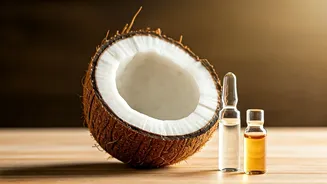Coconut Milk: The Basics
Coconut milk, extracted from the flesh of mature coconuts, is a common ingredient in many cuisines, especially in India. This milk is known for its rich
flavor and creamy texture, making it a popular alternative to dairy milk. However, it also contains a high amount of saturated fat. It's crucial to understand how this fat content impacts cholesterol levels. While some saturated fats can negatively affect heart health, the type and quantity of saturated fats in coconut milk are areas of ongoing research and debate. Therefore, a balanced approach is important when incorporating it into your diet. This section will introduce the composition of coconut milk and lay the foundation for understanding its impact on cholesterol.
HDL Cholesterol Explained
HDL, or High-Density Lipoprotein cholesterol, is often referred to as 'good' cholesterol. Its primary function is to transport cholesterol from the arteries back to the liver, where it can be processed and removed from the body. Higher levels of HDL are generally associated with a lower risk of heart disease. Research suggests that certain dietary choices can influence HDL levels. Some studies suggest that the saturated fats in coconut milk may have a positive impact on HDL cholesterol, potentially increasing its levels. However, it's essential to consider that the overall dietary context, including other fats, fibers, and overall calorie intake, plays a significant role in determining how your HDL is affected. This section focuses on the role of HDL and the potential, yet complex, relationship with coconut milk consumption.
LDL Cholesterol and Risks
Low-Density Lipoprotein (LDL) cholesterol, often referred to as 'bad' cholesterol, is a type of fat that can accumulate in the arteries, forming plaque. High levels of LDL cholesterol increase the risk of heart disease, stroke, and other cardiovascular problems. The saturated fat content of coconut milk is a point of concern for some. Saturated fats can raise LDL cholesterol levels in some people. However, the effect of coconut milk on LDL levels can vary significantly. Factors like the type of coconut milk used (e.g., full-fat vs. reduced-fat), overall dietary habits, and individual metabolism are all very important. Consuming coconut milk as part of a balanced diet, which includes plenty of fiber, fruits, vegetables, and unsaturated fats, might mitigate the potentially negative impact on LDL cholesterol levels. This section will delve into the risks associated with LDL cholesterol and how these risks might relate to coconut milk intake.
Coconut Milk's Fat Profile
Coconut milk contains a unique combination of fats, with a significant portion being saturated fat. However, the saturated fats in coconut milk are primarily medium-chain triglycerides (MCTs). MCTs are metabolized differently compared to long-chain triglycerides found in other foods. They are absorbed more quickly and may be converted into energy by the body rather than stored as fat. This different metabolic pathway has led to research into the possible health benefits of MCTs, including those found in coconut milk. These benefits potentially include improved metabolism, a slight increase in satiety, and even positive effects on cholesterol levels. However, it's very important to note that more research is needed to fully understand the effects of MCTs, and that it's important to consume coconut milk in moderation.
Heart Health Implications
The effect of coconut milk on overall heart health is complex. Some studies suggest it may have neutral or even beneficial effects on cholesterol profiles, while others raise concerns due to its saturated fat content. The overall dietary pattern and lifestyle factors are critical in determining the impact on your heart health. A diet rich in fruits, vegetables, whole grains, and lean proteins, in combination with regular physical activity and a balanced approach to fat intake, is crucial. If coconut milk is included in your diet, it should be done in moderation. You need to consider the quantity you're consuming and how it fits into your overall dietary pattern. Monitoring cholesterol levels through regular check-ups is always recommended. This can help you assess the impact of coconut milk and make informed choices to safeguard your heart health. This section focuses on how coconut milk fits into the overall picture of heart health.
Making Informed Choices
To make informed choices about coconut milk and your heart health, start by considering your overall dietary habits. If you have a diet high in saturated fats from other sources, it's prudent to moderate your coconut milk intake. Opting for reduced-fat coconut milk options can be a smart move if you're concerned about your cholesterol levels. Read food labels carefully to understand the fat content and ingredients. Combining coconut milk with heart-healthy ingredients, such as fruits, vegetables, and sources of omega-3 fatty acids, can help balance its impact. Consulting with a healthcare professional or a registered dietitian is also valuable. They can help you assess your individual needs and advise on the most suitable dietary approach for your health goals. This will help you make decisions best suited for your body.
























